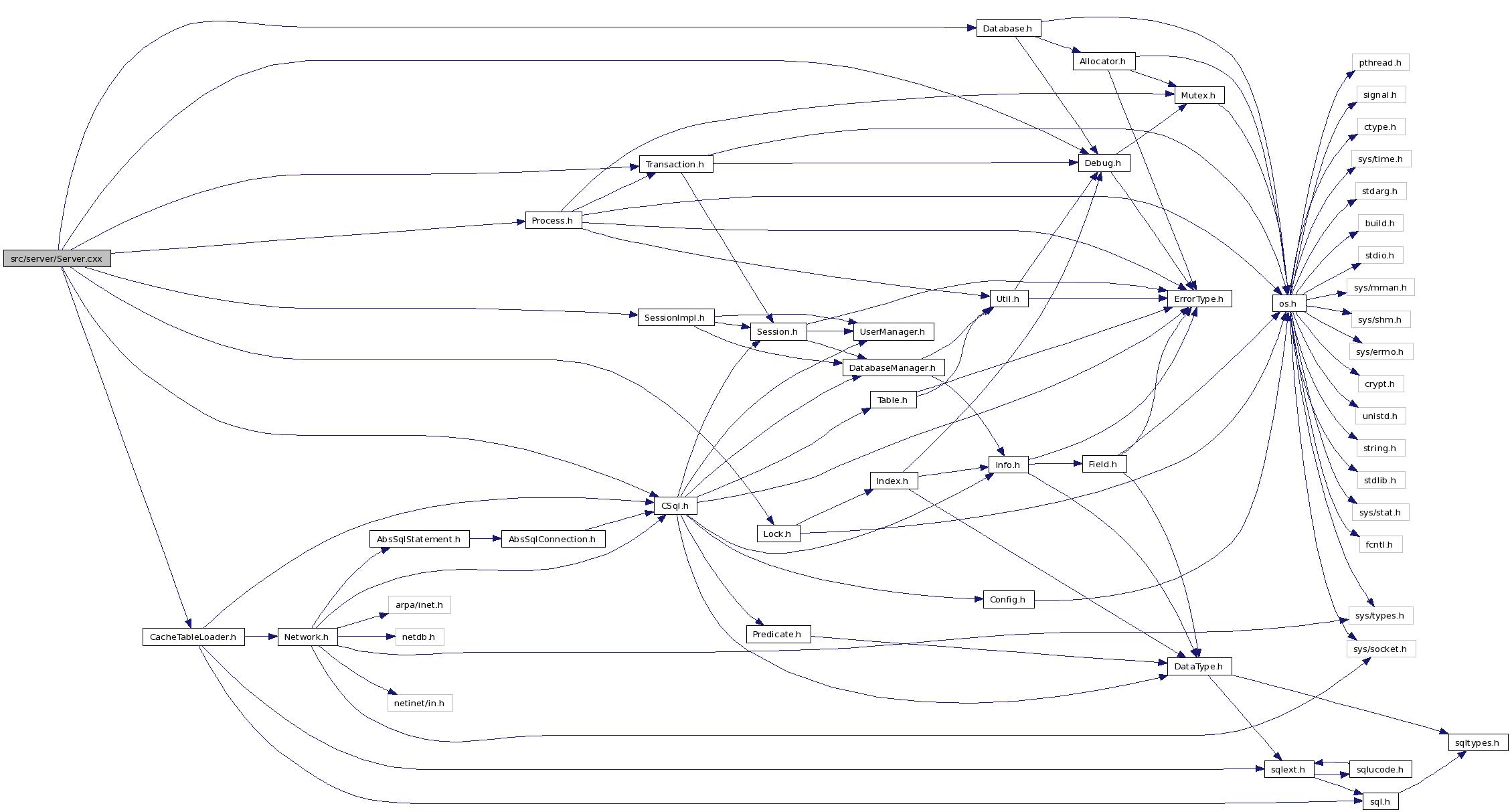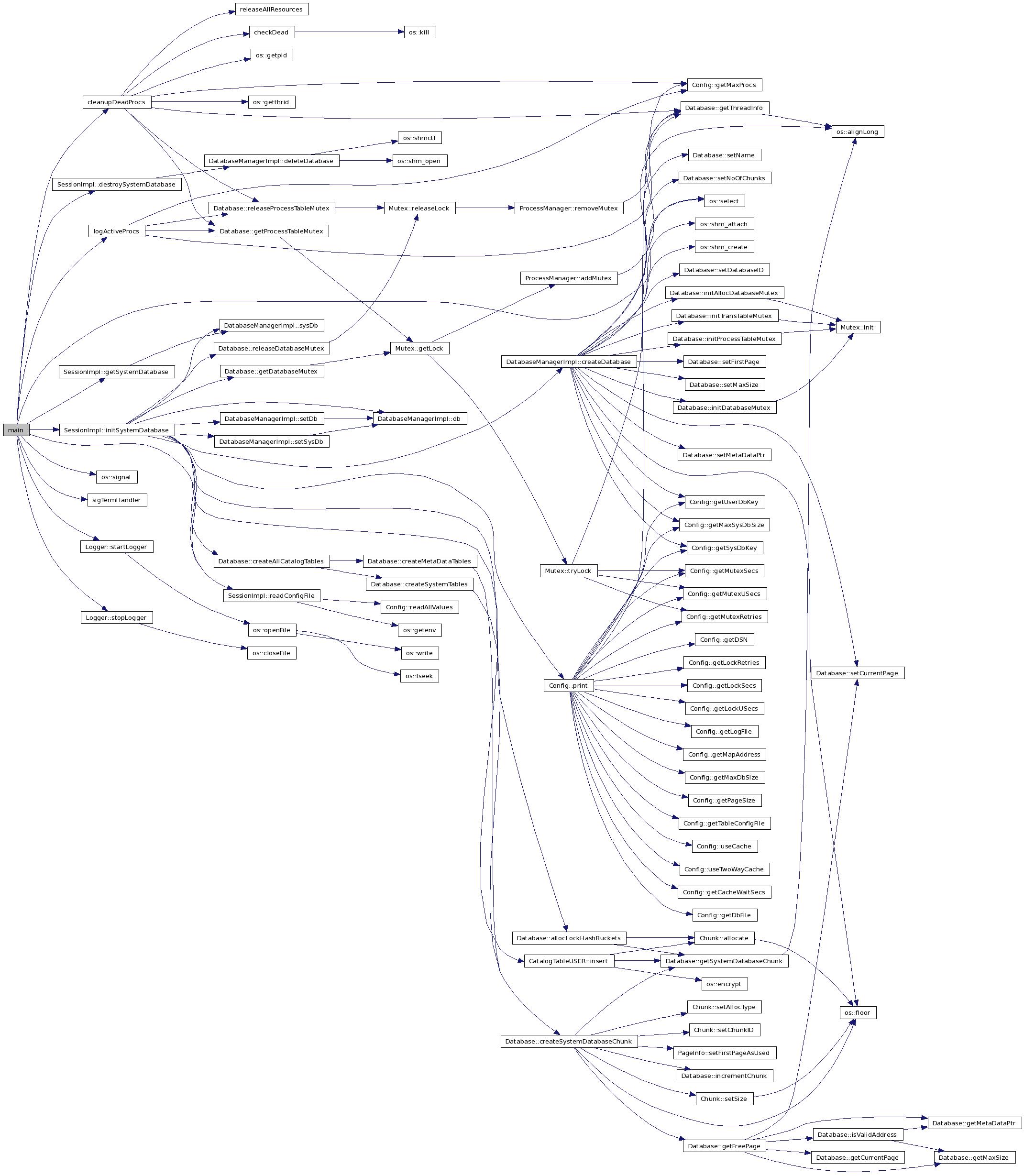
#include <CSql.h>#include <SessionImpl.h>#include <Debug.h>#include <Process.h>#include <Database.h>#include <Transaction.h>#include <Lock.h>#include <CacheTableLoader.h>Include dependency graph for Server.cxx:

Go to the source code of this file.
Functions | |
| static void | sigTermHandler (int sig) |
| bool | checkDead (pid_t pid) |
| DbRetVal | releaseAllResources (Database *sysdb, ThreadInfo *info) |
| DbRetVal | cleanupDeadProcs (Database *sysdb) |
| DbRetVal | logActiveProcs (Database *sysdb) |
| int | main () |
Variables | |
| int | srvStop = 0 |
| bool checkDead | ( | pid_t | pid | ) |
Definition at line 32 of file Server.cxx.
References os::kill().
Referenced by cleanupDeadProcs(), and main().
00033 { 00034 int ret = os::kill(pid, 0); 00035 if (ret == -1) return true; else return false; 00036 }
Here is the call graph for this function:

Here is the caller graph for this function:

Definition at line 69 of file Server.cxx.
References checkDead(), Conf::config, Config::getMaxProcs(), os::getpid(), Database::getProcessTableMutex(), Database::getThreadInfo(), os::getthrid(), OK, ThreadInfo::pid_, printError, releaseAllResources(), and Database::releaseProcessTableMutex().
Referenced by main().
00070 { 00071 DbRetVal rv = sysdb->getProcessTableMutex(false); 00072 if (OK != rv) 00073 { 00074 printError(rv,"Unable to get process table mutex"); 00075 return rv; 00076 } 00077 pid_t pid; 00078 pid = os::getpid(); 00079 pthread_t thrid = os::getthrid(); 00080 00081 00082 ThreadInfo* pInfo = sysdb->getThreadInfo(0); 00083 int i=0; 00084 ThreadInfo* freeSlot = NULL; 00085 for (; i < Conf::config.getMaxProcs(); i++) 00086 { 00087 //check whether it is alive 00088 if (pInfo->pid_ !=0 && checkDead(pInfo->pid_)) releaseAllResources(sysdb, pInfo); 00089 pInfo++; 00090 } 00091 sysdb->releaseProcessTableMutex(false); 00092 return OK; 00093 }
Here is the call graph for this function:

Here is the caller graph for this function:

Definition at line 96 of file Server.cxx.
References Conf::config, Config::getMaxProcs(), Database::getProcessTableMutex(), Database::getThreadInfo(), logFine, logger, OK, ThreadInfo::pid_, printError, Database::releaseProcessTableMutex(), and ThreadInfo::thrid_.
Referenced by main().
00097 { 00098 DbRetVal rv = sysdb->getProcessTableMutex(false); 00099 if (OK != rv) 00100 { 00101 printError(rv,"Unable to get process table mutex"); 00102 return rv; 00103 } 00104 ThreadInfo* pInfo = sysdb->getThreadInfo(0); 00105 int i=0; 00106 ThreadInfo* freeSlot = NULL; 00107 for (; i < Conf::config.getMaxProcs(); i++) 00108 { 00109 if (pInfo->pid_ !=0 ) logFine(logger, "Registered Procs: %d %lu\n", pInfo->pid_, pInfo->thrid_); 00110 pInfo++; 00111 } 00112 sysdb->releaseProcessTableMutex(false); 00113 return OK; 00114 }
Here is the call graph for this function:

Here is the caller graph for this function:

| int main | ( | ) |
Definition at line 118 of file Server.cxx.
References cleanupDeadProcs(), Conf::config, SessionImpl::destroySystemDatabase(), SessionImpl::getSystemDatabase(), SessionImpl::initSystemDatabase(), logActiveProcs(), logFine, logger, OK, SessionImpl::readConfigFile(), os::select(), os::signal(), sigTermHandler(), srvStop, Logger::startLogger(), and Logger::stopLogger().
00119 { 00120 SessionImpl session; 00121 DbRetVal rv = session.readConfigFile(); 00122 if (rv != OK) 00123 { 00124 printf("Unable to read the configuration file \n"); 00125 return 1; 00126 } 00127 os::signal(SIGINT, sigTermHandler); 00128 os::signal(SIGTERM, sigTermHandler); 00129 rv = logger.startLogger(Conf::config.getLogFile(), true); 00130 if (rv != OK) 00131 { 00132 printf("Unable to start the logger\n"); 00133 return 2; 00134 } 00135 00136 logFine(logger, "Server Started"); 00137 int ret = session.initSystemDatabase(); 00138 if (0 != ret) 00139 { 00140 printf(" System Database Initialization failed\n"); 00141 return 3; 00142 } 00143 printf("System Database initialized\n"); 00144 00145 00146 bool end = false; 00147 00148 struct timeval timeout, tval; 00149 timeout.tv_sec = 5; 00150 timeout.tv_usec = 0; 00151 Database* sysdb = session.getSystemDatabase(); 00152 printf("Database server recovering cached tables...\n"); 00153 00154 system("cachetable -u root -p manager -r"); 00155 00156 printf("Cached Tables recovered\n"); 00157 00158 printf("Database server started\n"); 00159 00160 while(!srvStop) 00161 { 00162 tval.tv_sec = timeout.tv_sec; 00163 tval.tv_usec = timeout.tv_usec; 00164 os::select(0, 0, 0, 0, &tval); 00165 00166 //send signal to all the registered process..check they are alive 00167 cleanupDeadProcs(sysdb); 00168 00169 } 00170 00171 logFine(logger, "Server Exiting"); 00172 logActiveProcs(sysdb); 00173 printf("Server Exiting\n"); 00174 logFine(logger, "Server Ended"); 00175 logger.stopLogger(); 00176 session.destroySystemDatabase(); 00177 return 0; 00178 }
Here is the call graph for this function:

| DbRetVal releaseAllResources | ( | Database * | sysdb, | |
| ThreadInfo * | info | |||
| ) |
Definition at line 38 of file Server.cxx.
References ThreadInfo::has_, logFine, logger, MAX_MUTEX_PER_THREAD, Mutex::name, ThreadInfo::pid_, srvStop, and ThreadInfo::thrid_.
Referenced by cleanupDeadProcs().
00039 { 00040 printf("Releasing all the resources for process %d %lu\n", info->pid_, info->thrid_); 00041 //recover for all the mutexes in has_ 00042 for (int i =0; i < MAX_MUTEX_PER_THREAD; i++) 00043 { 00044 if (info->has_[i] != NULL) 00045 { 00046 printf("Dead Procs: %d %lu holding mutex %x %s) \n", info->pid_, info->thrid_, info->has_[i], info->has_[i]->name); 00047 logFine(logger, "Dead Procs: %d %lu holding mutex %x %s) \n", info->pid_, info->thrid_, info->has_[i], info->has_[i]->name); 00048 //TODO::recovery of mutexes 00049 //info->has_[i]->recoverMutex(); 00050 srvStop = 1; 00051 } 00052 } 00053 TransactionManager *tm = new TransactionManager(); 00054 LockManager *lm = new LockManager(sysdb); 00055 for (int i = 0 ;i < MAX_THREADS_PER_PROCESS; i++) 00056 { 00057 if (info->thrTrans_[i].trans_ != NULL && info->thrTrans_[i].trans_->status_ == TransRunning) 00058 { 00059 printf("Rollback Transaction %x\n", info->thrTrans_[i].trans_); 00060 tm->rollback(lm, info->thrTrans_[i].trans_); 00061 } 00062 } 00063 info->init(); 00064 delete tm; 00065 delete lm; 00066 return OK; 00067 }
Here is the caller graph for this function:

| static void sigTermHandler | ( | int | sig | ) | [static] |
Definition at line 26 of file Server.cxx.
References srvStop.
Referenced by main().
00027 { 00028 printf("Received signal %d\nStopping the server\n", sig); 00029 srvStop = 1; 00030 }
Here is the caller graph for this function:

| int srvStop = 0 |
Definition at line 25 of file Server.cxx.
Referenced by main(), releaseAllResources(), and sigTermHandler().
 1.4.7
1.4.7